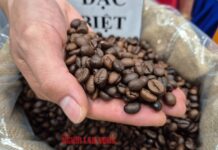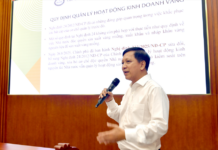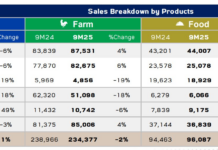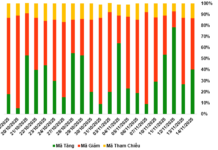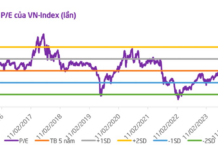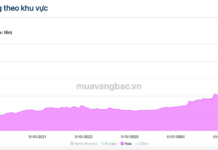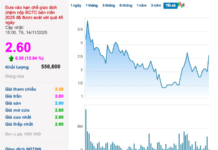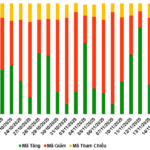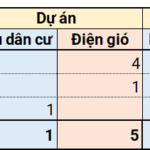According to experts, to penetrate the US market in particular and other countries in general, Vietnamese businesses need professional and systematic consulting support.

Vietnam’s coffee exports to the US account for 20% of total coffee exports. Source: R.B.C
It can be seen that, among Vietnam’s export products to other countries, most are handicraft, garment, leather and footwear, and processed agricultural products. For fresh agricultural products such as fruits and rice, which are Vietnam’s strengths, it is still difficult to penetrate the market. Up to now, Vietnam has only exported eight types of fresh fruits to the US market, such as lychees, longans, dragon fruits, and green-skinned grapefruits.
To better understand the barriers, difficulties, and opportunities for Vietnamese businesses when entering the global market, especially the US market, Tin Tuc Newspaper had a conversation with Ms. Nguyen Thi Bich Thuy, Deputy Head of the Office of Small and Medium Enterprises (under the Enterprise Development Agency of the Ministry of Planning and Investment), with the perspective and capacity as the representative of the Management Board of the Project for Enhancing the Competitiveness of the Vietnamese Private Sector, funded by the United States Agency for International Development (USAID) and the Enterprise Development Agency as the project owner.
What are the strengths and weaknesses of Vietnamese enterprises, especially small and medium-sized enterprises in the field of export, particularly to the US market at present?
Small and medium-sized enterprises in Vietnam, like most small and medium-sized enterprises in the world, have similar limitations. These limitations arise from the very nature of the small, small, and medium scale of the enterprise.
Specifically, they often lack management skills, technological qualifications, and are unable to attract sufficient or diverse financial resources suitable for production and business activities. They also lack information and access to support from the State. Not every business pays attention to support projects and programs.
Another characteristic of small and medium-sized enterprises in Vietnam is that they have a spirit of learning and aim to improve production and business efficiency but often pursue unmethodical goals. In addition, small and medium-sized enterprises are also not accustomed to using consulting services so that experts and consultants can support and accompany the upgrading of the enterprise’s activities.
Also, because of their small scale, they have a flexible structure and are easy to adapt, but this comes with the downside of not yet having a professional organization, which also leads to small and medium-sized enterprises often working unmethodically in strategy formulation and business planning.

Ms. Nguyen Thi Bich Thuy, Deputy Head of the Office of Small and Medium Enterprises, shares information with reporters.
However, in recent years, small and medium-sized enterprises in Vietnam, especially those in provinces and large cities, have had a clearer perception of how to have a business strategy towards rapid and sustainable development.
Through contact, some enterprises shared that if they continue to develop normally in terms of business and labor scale as at present, their profits will not fluctuate much. They still have stable revenue and can create jobs for a certain number of workers, but in the long run, if they do not proactively change to adapt to the rapid changes in the world and domestic economy, their businesses will also be at a disadvantage and lose development opportunities.
The story of finding a way to export is similar. Enterprises always have expectations and targets to expand their markets and bring their products to the world. But generally, many businesses are still wondering where to start, or even choosing the wrong path, wasting time and money in vain.
In fact, information is not lacking, and if necessary, enterprises can find it on the internet or be provided by state agencies. However, what is important is that enterprises need professional support organizations and systematic guidance to help them shorten the time, roadmap, and cost to achieve this goal. Only with professional consulting support can enterprises know what standards and conditions they lack and what necessary resources they need to prepare for market penetration.
After organizing the workshop on “Penetrating the Global Market” in Ho Chi Minh City recently, what is your assessment of the enterprises? What are they most concerned about and want at the moment?
Through the two-day workshop, we found that enterprises are very interested and many enterprises have actively sought information. However, as I have shared above, most of the participating enterprises are still groping and have not systematized information and determined an effective roadmap.
In fact, not every enterprise is ready to pay for consulting services or invest properly in activities such as product traceability, brand building, standards, and certifications, as well as improving production capacity to meet export conditions, especially to high-end markets such as Europe and the US.
In addition, amid a wealth of information and numerous solutions from business support service providers, not every enterprise has enough information to filter out what is suitable for them. This shows the crucial role of business support organizations (both public and private), business consulting units, and experts through support activities from both state budget resources and international organizations. These supports can start from typical enterprises and then replicate the model, package guidance documents, and apply simple and reasonably priced tools for small and medium-sized enterprises.
Typically, the Project for Enhancing the Competitiveness of the Vietnamese Private Sector has activities to support both breadth (training, large-scale workshops) and depth (in-depth consulting by group or one-on-one), thereby helping enterprises to be equipped with general and in-depth technical information and skills that can be applied in practice. production and business activities, thereby improving efficiency. In addition, enterprises can clearly see the steps to achieve the goal, and in each step, they need to meet and interact with relevant units or organizations to help them complete it.
For example, a full list of organizations in Vietnam with FDA, APHIS, and other accreditation powers can also be of great help to businesses. At least, they won’t be “groping” anymore but can find the right place and meet the right people, saving time and unnecessary costs.
Can you share more about the demand of the US market for key products from Vietnam at present?
From the perspective of a business supporter, I find that Vietnamese agricultural products and processed agricultural products are still potential items in the US market. Also, according to experts, the shift in US consumer trends in the post-COVID-19 era has helped Vietnamese agricultural products increase their chances of penetrating the US market.
Before, Americans liked fast food and the habit of cooking regularly, but after the pandemic, they started to return to cooking at home, thereby also returning to shopping for agricultural products, especially sustainable agricultural products. That is an opportunity for Vietnamese agriculture.
In addition to agricultural products, Vietnamese products that are currently attracting and being exported to the US market include wood and furniture, leather and footwear, textiles and garments, machinery, and products related to auxiliary industries. In addition, there are organic products and processed foods.
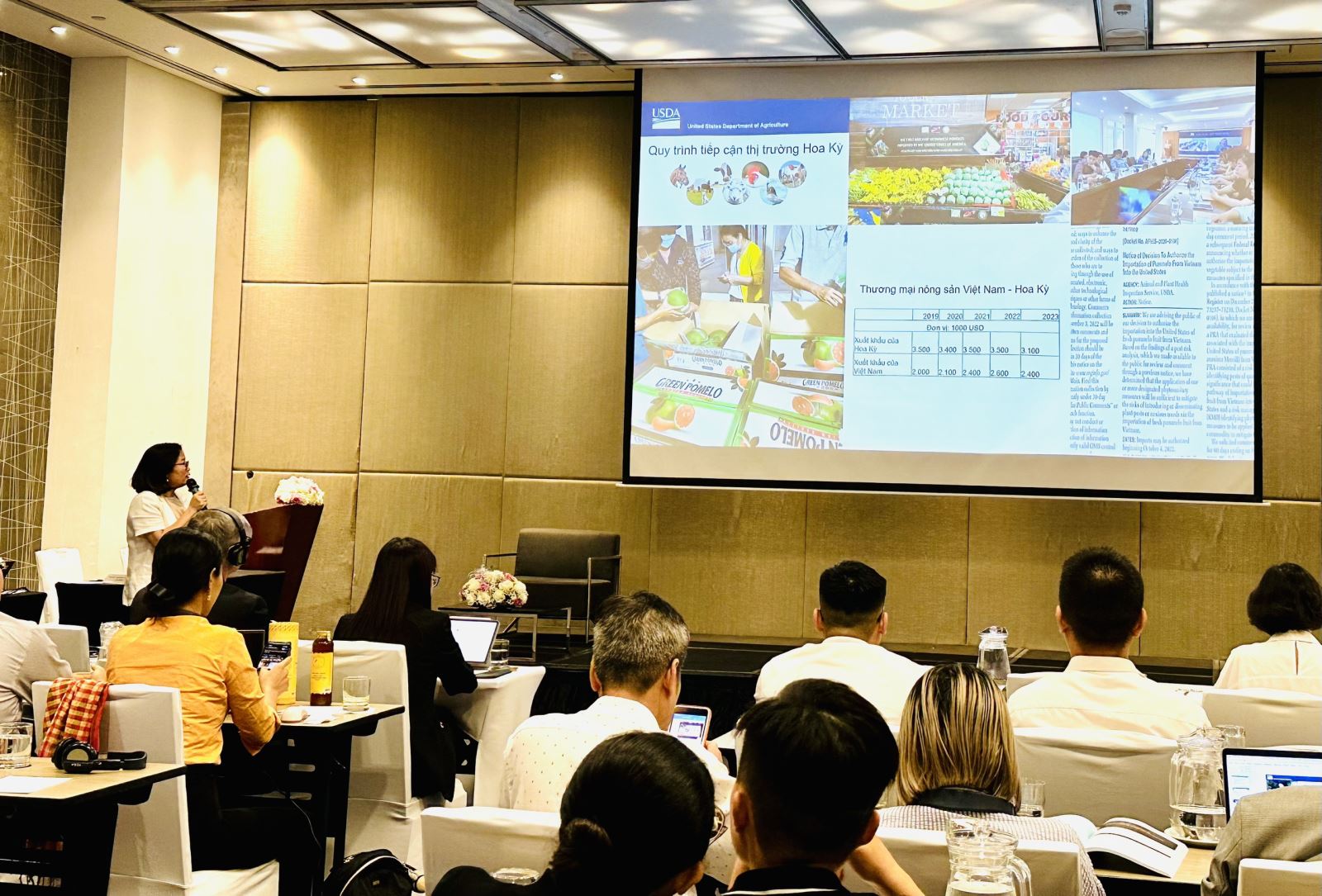
The workshop on “Penetrating the Global Market” helps small and medium-sized enterprises to grasp information and steps when exporting to difficult markets, especially the US.
In previous projects, also funded by USAID, we implemented a chain linkage between small and medium-sized Vietnamese enterprises and leading enterprises, focusing on three priority sectors: manufacturing, electricity-electronics, and precision mechanics. The results obtained were very good export contracts to the US. Of course, to export to the US market, we had to spend a minimum of one to two years supporting enterprises in meeting the requirements of this demanding market.
Experts, especially those from the US, had to go directly to each factory to help enterprises upgrade their production standards. Project experts provided on-site consulting and guidance to help enterprises apply technology and streamline production to reduce costs and thereby improve competitiveness, especially in competing with Chinese products.
The US market is always very potential. The important thing is whether the products of small and medium-sized Vietnamese enterprises can meet their requirements or not.
Also, according to the project experts who shared at this workshop, Vietnam is the leading rice exporter, but Vietnamese rice is almost “absent” in the US market. The main reason is still the story of quarantine and the production process right from the selection of varieties and cultivation. A representative of a rice exporting enterprise shared that to enter the US market, they had to go through more than 300 quarantine and inspection criteria. Meanwhile, Vietnamese farmers’ habits of using many chemicals and pesticides in the rice cultivation process are not easy to change in the short term.
Similarly, Vietnamese fresh fruit is difficult to penetrate the US market, still facing strict quarantine and pest control issues. Processed products have more opportunities.
So, what are the lessons and experiences for Vietnamese enterprises?
Vietnamese enterprises are becoming more proactive because they realize that if they do not upgrade and innovate themselves, in about three to five years, they will be at a disadvantage even in the domestic market, not to mention the international market. Therefore, enterprises determine that they need to take the lead and proactively seek experts, reputable support units, or learn from successful enterprises, which is the choice of many enterprises today. This is a positive signal because having the right perception is a necessary condition, but whether there are enough resources to do so is also a calculation of small and medium-sized enterprises.
Therefore, our advice to small and medium-sized Vietnamese enterprises in exporting products to foreign markets is first the awareness of the enterprise to build and pursue the business philosophy and vision of the enterprise. Once enterprises have the right perception of the need for sustainable development and have a long-term vision, they will be able to determine their business strategy and make investments commensurate with each stage of development. Enterprises cannot be “short-sighted” forever, or be satisfied with “easy-going” export markets.
Second, enterprises need to be proactive in information and proactive in approaching support units (both public and private), experts, and enterprises in the same ecosystem. Project experts have shared at the workshop about two approaches. The first way is that enterprises can find buyers in the market first, and then look back at what their enterprise is lacking and upgrade to meet the requirements of the buyer and the export market. The second way is that if the enterprise has the scale and resources, it should prepare in advance some mandatory and basic standards. When customers come, the enterprise is proactive and ready to meet the requirements of the buyer, creating trust from the beginning.
Third, small and medium-sized enterprises need to gradually transparentize their activities and financial data to build trust with partners at home and abroad.
Thank you for your time!


